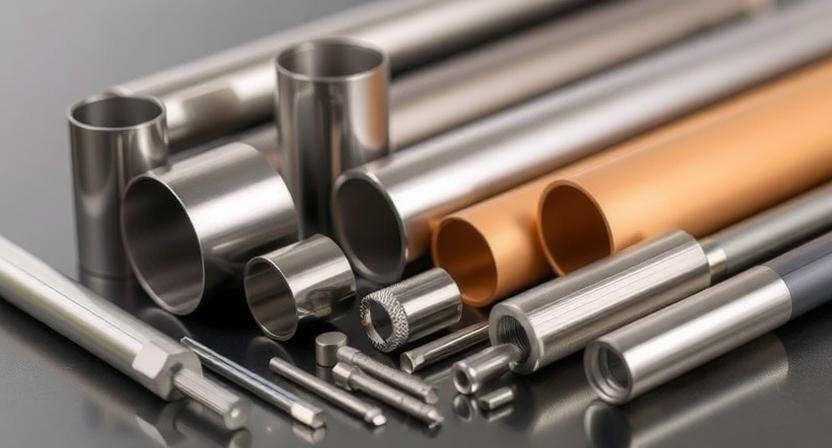The short, simple answer is: No, titanium does not rust.
It can't rust because it doesn't contain the key ingredient needed for rust to form: iron. Instead, titanium uses a clever trick to protect itself, making it one of the most durable metals on the planet.
Before we talk about titanium, let’s quickly clear up what rust is. Rust is a specific type of corrosion that only happens to iron and metals that contain iron, like steel. The scientific name for rust is iron oxide.
It's a chemical reaction where iron, oxygen, and water mix together. This process creates that flaky, reddish-brown material we call rust. If a metal doesn't have iron, it simply can't rust.

Titanium is a reactive metal, which sounds bad, but it’s actually the secret to its amazing durability. When titanium is exposed to air or water, it instantly reacts with the oxygen to create a super-thin surface layer called titanium dioxide (TiO₂).
Think of this layer as an invisible, armored shield. It's incredibly tough and chemically stable. This protective film is what stops the titanium underneath from reacting with anything else, including saltwater, chemicals, and most acids.
Even better, this shield is self-healing. If you scratch a piece of titanium, the exposed metal immediately forms a new protective TiO₂ layer, making it resistant to corrosion all over again.
While it won't rust, titanium can technically corrode under extremely rare and specific conditions. This is not something you need to worry about with your titanium watch, bike, or jewelry.
Extreme Heat: At very high temperatures (hundreds of degrees), the protective oxide layer can break down, leading to different types of oxidation.
Specific Chemicals: Only a few very strong, non-oxidizing acids (like pure hydrofluoric acid) can break through the protective layer. Again, this is not a common household or outdoor concern.
For all practical, everyday purposes—from deep-sea diving to wearing it every day—titanium is considered corrosion-proof.
Most titanium products, like those used in aerospace or medical implants, are made from titanium alloys (mixtures of titanium and other metals, like aluminum and vanadium). The most common is Ti-6Al-4V.
The good news is that these alloys keep the same amazing corrosion resistance. As long as the surface has titanium, it will instantly form that protective TiO₂ layer, keeping the whole piece safe from rust and corrosion.
Stainless steel is also known for its resistance to rust, but titanium is the clear winner in harsh environments. Here’s a quick comparison:
| Feature | Titanium | Stainless Steel (e.g., 316L) |
|---|---|---|
| Rust (Iron Oxide) | Never (No iron content) | No, but can suffer from other corrosion |
| Saltwater Resistance | Excellent (Used in marine and deep-sea applications) | Good, but can suffer from **pitting** and **crevice corrosion** |
| Protection Method | Self-healing Titanium Dioxide (TiO₂) layer | Chromium Oxide layer (can be damaged) |
| Weight | Very light | Significantly heavier |
If you need something that absolutely, positively cannot fail in a corrosive environment, titanium is the superior choice.
If you see a reddish-brown spot on your titanium gear, don't panic and don't think you bought a fake! It's almost always a case of surface contamination.
This happens when tiny bits of iron or steel dust—maybe from a tool, a steel screw, or even iron-rich dust in the air—land on the titanium. This iron dust then rusts, and the titanium simply holds onto it. The titanium itself is perfectly fine.
How to fix it: A simple wipe with a cloth, some mild soap, or a non-abrasive cleaner will usually remove the surface rust completely.
While titanium is tough, you need to be careful when you attach it to other metals, especially in a wet environment (like a boat or an outdoor structure). This is called galvanic corrosion.
When two different metals touch while submerged in an electrolyte (like saltwater), one metal will corrode much faster than normal. Because titanium is so noble (resistant to corrosion), it will cause the less noble metal (like aluminum, copper, or carbon steel) to corrode quickly. If you are using titanium screws, make sure the material you are screwing into is also corrosion-resistant.
Absolutely not. Titanium is one of the best metals for use in saltwater. It is completely resistant to corrosion from chlorides, making it perfect for marine, diving, and offshore applications.
Yes! Titanium is an excellent choice for jewelry. It is lightweight, incredibly strong, and completely hypoallergenic. Since it doesn't rust or tarnish, it will keep its look forever.
No. The natural titanium dioxide layer that forms on its surface is the best protective coating it could ever have. Any other coating is purely for color or decoration, not for protection.
If you're looking for the ultimate in corrosion resistance and durability for your next project, medical device, or industrial application, titanium is the answer.
Contact our experts today for a consultation on your specific titanium material needs.
Consult Our Titanium Experts